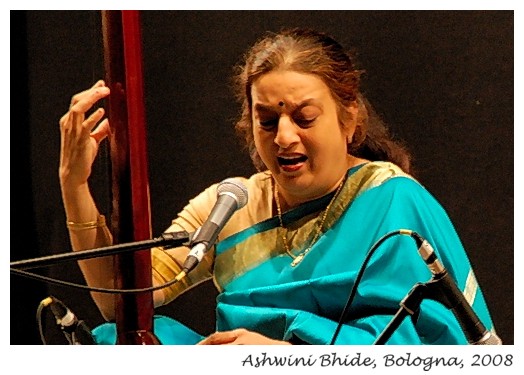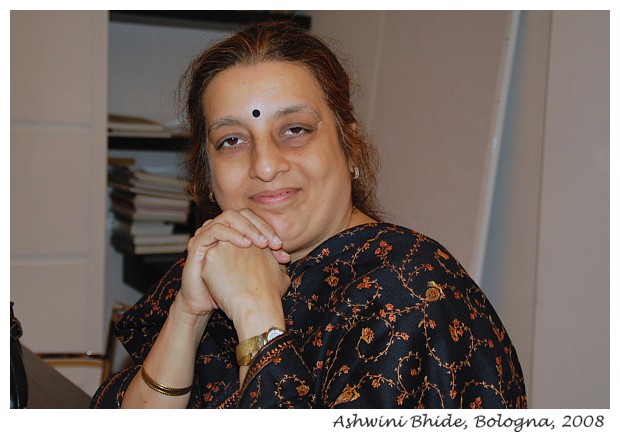Meet the Artist: Ashwini Bhide DeshpandeyPart 1 of a long interview by Dr Sunil Deepak, Bologna, Italy, 11 November 2008
Ashwini Bhide Deshpandey is one of the most important exponent of Jaipur Atrauli gharana of Hindustani classical vocal music today. At a young age she has gained a formidable reputation as a classical singer, who mixes virtuosity of her art with innovations. Apart from being an artist, Ms. Bhide Deshpandey has also done masters in microbiology and a PhD in biochemistry.
She had come to Bologna for two music concerts as part of an initiative called Suoni dal Mondo (Sounds from the world) organised by the Drama and Performing Arts department of Bologna university (DAMS), in collaboration with Indian Council of Cultural Relations. In these concerts she was accompanied by Vishwanath Shirodhkar (Tabla), Seema Shirodhkar (Harmonium) and Saili Oak (vocal). All three are there in the pictures with Ashwini ji in the concert pictures of this article. During this visit, I had an opportunity to talk to her. This is part 1 of a long interview. The links to the remaining parts of this interview are given below:
Interview
Sunil: Your sing Hindustani classical music and at the same time you are a trained microbiologist and PhD in Biochemistry. Aren’t these two completely different worlds, each with their own logic? Do you see that as a contradiction or does the scientific part of you helps you to look at your creative part in a different way?
Ashwini: For me they were both always part of my life and I never treated them as two different worlds. For me they were always complementary, one complemented the other. I grew up in a house where everybody, my parents and my grandparents, everybody was interested in music. I was initiated very early into music, to learn it and not with the idea of taking it as a profession later on. I was told that “music is good and this is part of your tradition, so you must learn, and when you grow up we shall see if you wish to take it up.” So I learnt it for the love of it, for the beauty of it and for the wisdom of it.

As far as my academic pursuits were concerned, I was always a bright student at the school and college. So it followed a very natural course of events that when I did my school, and then I went to college and at that time, I wanted to do some fundamental research like my father who was a physicist. I thought that I shall pursue a scientific research career like him. He was a man of physics while I was not so good in physics so I took biology, biochemistry and microbiology. But all along, I also had my music learning going on in parallel and it integrated beautifully in my life as it had in my parent’s life.
Like a child comes home from school, does home work, in the same way I did my daily music riyaaz. So I think that that stayed with me and afterwards, when I completed my PhD, I decided to give my music a try. I wanted to see to myself if I was happy to do it. I started then and I have not stopped.
Sunil: I can understand that. Many of us live with contradictions, we just learn to put them together and we don’t have to think about that consciously. For example, think of science and religion, both have different logics that do not match each other, yet in our daily lives we just put them together. However, you are a scientist and an experienced musician and it is full time passion with you. If you look at science and music, can you see differences in their logics, can you draw some conclusions about that?
Ashwini: I have to correct there, I am not doing science any more. I am a full time musician now. I completed my PhD and then I gave up science, I had a full stop there and ever since it has been like that.
Sunil: But PhD means a deep commitment with science and something must be remaining inside you?
Ashwini: There are things that it has taught me like having an analytical mind and also my approach to the subject of music is more systematic.
Sunil: In another interview, you had talked about the importance of not limiting to traditional way of thinking about music and about imbibing of influences from all around. If you think of globalisation and how it is influencing cultures, do you think that external influences to your music are positive or are there any negative aspects also?
Ashwini: We can’t decide now if those influences are positive or negative. I think that only time is the test and time will decide what was good and what was bad. I believe in the strength of Indian classical music. I think that we are changing, over the past few years so many things have changed, so it is very natural that music will also undergo lot of change. Someone need not be with an open mind to get influences and so you say “I was with an open mind and therefore I have changed”. Even if you do not have an open mind, your music changes anyway because you live a life where you face so many challenges. Whether you like it or not, the change happens, and if it does not change then it will get stagnated and it will not flow freely.
Sunil: You had these two different worlds of science and music in the family also. How did your parents reconcile these two different worlds?
Ashwini: My father is a scientist but he was also deeply interested in music, he was also a music student. My mother never did any science, but she was very strict and a disciplinerian and she made sure that I internalised the music. She was my guru, my mentor and my guide and even now, she guides my way. I trust her immensely for her aesthetics and her idea of beauty. I believe it without any doubt what she tells me as beautiful. Even this quality of having utmost faith in anybody, I think that it was instilled in me by my parents. So the two of them, my mother and father, always complemented each other. My father never had any say in my music training, when I was training under my mother. He never tried to impose his ideas although he was a music student and although he understood many of the fundamentals and many of the grammatical aspects of music. He never interfered in my music training.

Sunil: How many brothers and sisters are you? Did the others also take up music?
Ashwini: I have a brother, who is a doctor and he lives in London. He is interested in music as we were trained in music as children. He had trained to play sarod, he also knew little bit of tabla and little bit of vocal music as well. It was natural because his mother and sister were involved in music, and he understands music very well. He is very musical and I would say that he is even more musical than I am. Had he taken music, I am sure that he would have been a fabulous musician. But he didn’t take up music, he took up medicine. Even as a doctor, he is active in medical research, so again we have these two sides in us. He is a very busy and successful doctor.
End of Part 1 - Next Part
Remaining parts of the Interview:
